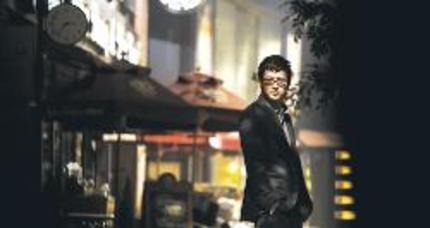TIFF Report: M Review

Have you ever had a conversation, interview or encounter that got away from you so far as to become embarrassing or painfully humiliating? For hours, even days, after the conversation may play over in your head, slightly altering in nuance until the horror of the event may be relived anywhere from a nervous frustration to a laugh inducing parody. The brain, still very much a mystery, has some unusual ways of purging and blending things to allow a person to move on.
Lee’s 2005 effort, The Duelist, was off-putting to many because his particular brand of confident yet manic style did not seem a very elegant (or effective) way to re-invent either the period epic or tragic romance. With M he has found a subject (to call it a story would be to imply that Lee has an interest in linear narrative, which would be highly misleading) so worthy of his visual peculiarities that images, thoughts and emotions swirl around long after the screen goes dark. The three way intersection of regret, anxiety and fantasy is embodied in a night-club located in the back alleys of the mind of writers block affected Min-Woo (Gang Dong-won who was also Sad Eyes in The Duelist). The ghost (Memory? Self-aware hybrid of the two?) of his brief but intense first love has begun to stalk him in both the back alleys, as well as waking life. This threatens the progress of his new novel. Looming failure (he has not written a word with deadline approaching and a large number of advances) is amplified by the variety of pressures of following up a commercially successful previous book. His marriage is suffering from his self-absorption. This culminates over the course of the film to an elliptical mental collapse that mashes together several of the visual motifs of The Shining with the ethereal anxiety of The Double Life Of Veronique. All of this is shot with such technical and aesthetic confidence that if there is a worthy ultra-modern successor to Kieslowski’s masterpiece, then this is it.
M is the opposite of a tone-piece. Like much of Myung-Se’s work, it revels in changing tone as quickly as possible. He plays with a variety of genres: farce, slapstick, horror, noir, romantic nostalgia, all of which are in the service of placing the viewer on the psychiatrist’s couch vicariously through Min-Woo’s breakdown. This may seem to require assemblage, like a jigsaw puzzle, to reveal a clearer picture of Min-Woo or his lost love Mimi. A better approach is to soak up the visual riffs and filter them through considerations of how anxiety affects perception (and influences behavior). There is plenty to chew on in this regard, but the images often purely evoke an emotional response. Not the kind given by getting the full story, but rather looking at a painting. This is no small feat, because M is anything but still. The images are often fast and furious. The net result is a balance of both the intellectual and the emotional. It is not perfect, but better for its imperfections.
M wants to juxtapose or parse (or both) the type of regret evoked from Roy Batty’s “All those moments will be lost in time, like tears in rain.” with Rick Blaine’s “We'll always have Paris”. The visualization of memory, or more important the visualization of remembering those memories is technically accomplished to the point to confirm the power of cinema, and there is still radical new ways of doing things worth discovering.
When Min-Woo locates the ghost of his lost love, there is confusion, then elation (shown in a sweet song and dance). He first tries to hold onto something so tight that everything else slips through his grasp. Reliving the pain, joy, suffering and ennui as a way of relieving it is why we tell each other stories in the first place. If it leads to any sort of discovery on how to deal with things, relax and ultimately restore faith and state of being, well, all the better.
[At this point in at TIFF, nearly 30 films in ranging from arthouse to multiplex to bloodsplattered grindhouse, combined with caffeine, alcohol and little in the way of actual sleep, the films, gatherings and frequent subway travels start to blend into an amorphous kaleidoscope. This may have created the perfect state of mind for viewing Lee Myung-Se’s rhythmic new cinematic poem. So far, it is the clear front runner for my personal favorite of this years festival.]







